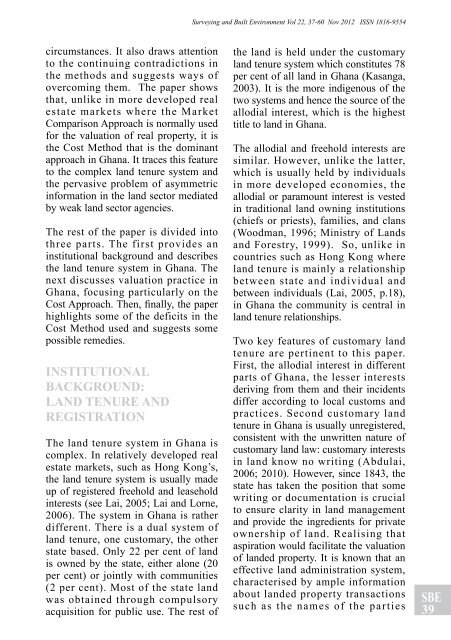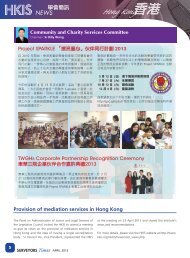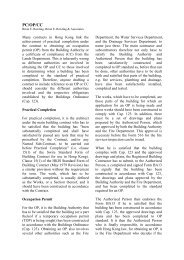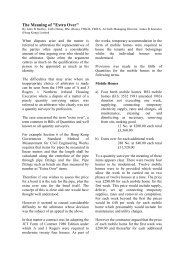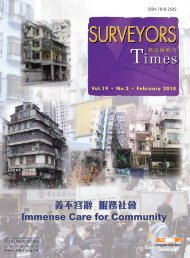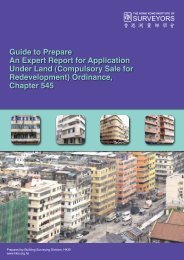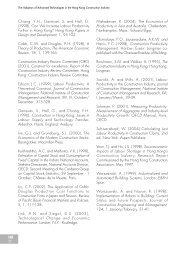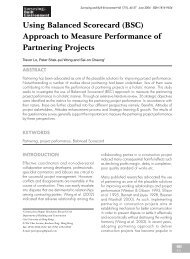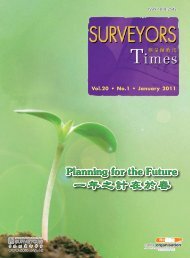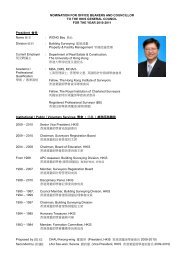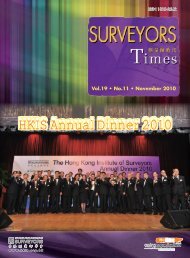Surveying & Built Environment Vol. 22 Issue 1 (December 2012)
Surveying & Built Environment Vol. 22 Issue 1 (December 2012)
Surveying & Built Environment Vol. 22 Issue 1 (December 2012)
Create successful ePaper yourself
Turn your PDF publications into a flip-book with our unique Google optimized e-Paper software.
circumstances. It also draws attention<br />
to the continuing contradictions in<br />
the methods and suggests ways of<br />
overcoming them. The paper shows<br />
that, unlike in more developed real<br />
estate markets where the Market<br />
Comparison Approach is normally used<br />
for the valuation of real property, it is<br />
the Cost Method that is the dominant<br />
approach in Ghana. It traces this feature<br />
to the complex land tenure system and<br />
the pervasive problem of asymmetric<br />
information in the land sector mediated<br />
by weak land sector agencies.<br />
The rest of the paper is divided into<br />
three parts. The first provides an<br />
institutional background and describes<br />
the land tenure system in Ghana. The<br />
next discusses valuation practice in<br />
Ghana, focusing particularly on the<br />
Cost Approach. Then, finally, the paper<br />
highlights some of the deficits in the<br />
Cost Method used and suggests some<br />
possible remedies.<br />
INSTITuTIoNAl<br />
BACKGRouNd:<br />
lANd TENuRE ANd<br />
REGISTRATIoN<br />
The land tenure system in Ghana is<br />
complex. In relatively developed real<br />
estate markets, such as Hong Kong’s,<br />
the land tenure system is usually made<br />
up of registered freehold and leasehold<br />
interests (see Lai, 2005; Lai and Lorne,<br />
2006). The system in Ghana is rather<br />
different. There is a dual system of<br />
land tenure, one customary, the other<br />
state based. Only <strong>22</strong> per cent of land<br />
is owned by the state, either alone (20<br />
per cent) or jointly with communities<br />
(2 per cent). Most of the state land<br />
was obtained through compulsory<br />
acquisition for public use. The rest of<br />
<strong>Surveying</strong> and <strong>Built</strong> <strong>Environment</strong> <strong>Vol</strong> <strong>22</strong>, 37-60 Nov <strong>2012</strong> ISSN 1816-9554<br />
the land is held under the customary<br />
land tenure system which constitutes 78<br />
per cent of all land in Ghana (Kasanga,<br />
2003). It is the more indigenous of the<br />
two systems and hence the source of the<br />
allodial interest, which is the highest<br />
title to land in Ghana.<br />
The allodial and freehold interests are<br />
similar. However, unlike the latter,<br />
which is usually held by individuals<br />
in more developed economies, the<br />
allodial or paramount interest is vested<br />
in traditional land owning institutions<br />
(chiefs or priests), families, and clans<br />
(Woodman, 1996; Ministry of Lands<br />
and Forestry, 1999). So, unlike in<br />
countries such as Hong Kong where<br />
land tenure is mainly a relationship<br />
between state and individual and<br />
between individuals (Lai, 2005, p.18),<br />
in Ghana the community is central in<br />
land tenure relationships.<br />
Two key features of customary land<br />
tenure are pertinent to this paper.<br />
First, the allodial interest in different<br />
parts of Ghana, the lesser interests<br />
deriving from them and their incidents<br />
differ according to local customs and<br />
practices. Second customary land<br />
tenure in Ghana is usually unregistered,<br />
consistent with the unwritten nature of<br />
customary land law: customary interests<br />
in land know no writing (Abdulai,<br />
2006; 2010). However, since 1843, the<br />
state has taken the position that some<br />
writing or documentation is crucial<br />
to ensure clarity in land management<br />
and provide the ingredients for private<br />
ownership of land. Realising that<br />
aspiration would facilitate the valuation<br />
of landed property. It is known that an<br />
effective land administration system,<br />
characterised by ample information<br />
about landed property transactions<br />
such as the names of the parties<br />
SBE<br />
39


